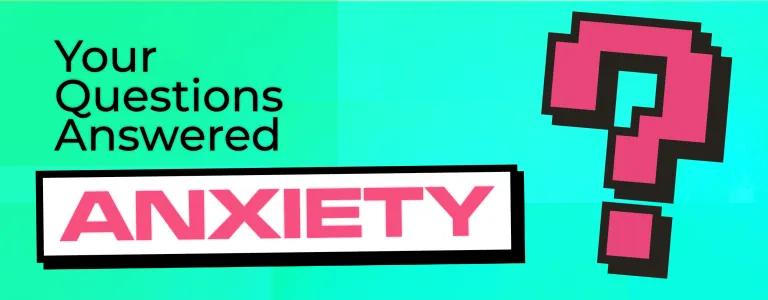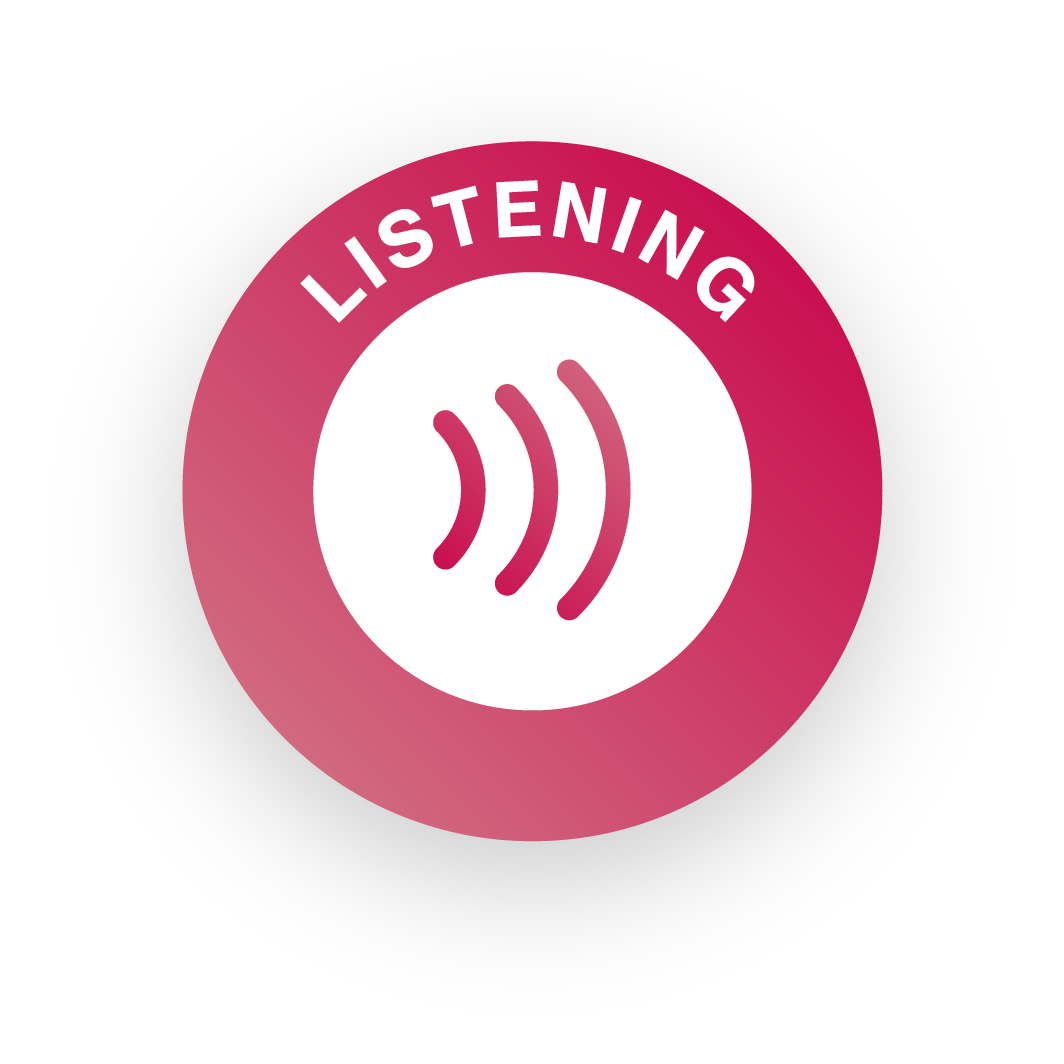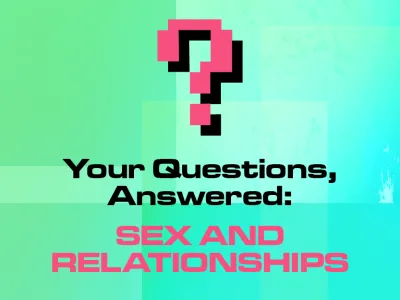
Your Questions Answered: Anxiety
By Kooth, the digital mental health support platform which provides free and anonymous support for young people.
Young people up and down the country shared their questions about anxiety. It’s great that so many people opened up — and Kooth, the free mental health support platform, are here to give their answers.
And by the way, if you’re feeling a little anxious about signing up to an NCS experience, that’s totally normal and you’re not alone. If it feels helpful, check out this blog by Monika where she shares honestly about her time on NCS and how it helped with her anxiety. For now though, let’s get into answering all the questions that were sent in.
Question: Why do panic attacks feel like you’re dying?
Answer: Panic attacks often occur as a result of sudden and intense fear, or a sense of having no control. The body often reacts with a physical response — changes to your breathing, spiralling thoughts, or a spike in adrenaline levels. Those changes can feel very emotionally unsettling. And while panic attacks will often settle themselves, in the moment they can feel extremely scary.
Question: Are anxiety attacks and panic attacks the same thing, just with different names?
Answer: Panic attacks usually occur without a known trigger — so they can feel like they’ve come out of nowhere. An anxiety attack will often be as a result of a perceived fear or a triggering thought. There can be similarities between anxiety and panic attacks, such as increased heart rate, changes to breathing, and feeling upset or distressed. Panic attacks may often feel very intense, but they generally last for a shorter time than an anxiety attack.
Question: I don't know what to say to my friend who is struggling with anxiety. What would you say?
Answer: It’s natural to want to find exactly the right words to say, but often just listening to a friend can be a great way to help them. Listening to them, and letting them know that they are safe, and that you’re there for them, can be really soothing. It can also be helpful to try and understand what your friend feels they need when they’re feeling particularly anxious — for example, some people may want to be hugged, while other people could find this a little overwhelming.

Question: What's the best song to listen to when anxious?
Answer: Songs that provoke emotional responses — like joy or sadness — may not always be the most relaxing. So choose a song that means something to you and which also offers you a sense of calm. You might want to listen to the sounds of rain or waves, which can often be quite tranquil. Having a playlist to help manage times of anxiety, can be a very helpful strategy.
Question: There’s this person who always makes me anxious. I’ve often got to be around them 😞 Got any tips?
Answer: When feeling uncomfortable around somebody, it’s important to acknowledge this and pay attention to your anxieties. Because you’ve asked the question, it sounds like you’re already doing this — which is really good. Try and speak to a trusted adult about how you’re feeling, and choose someone who may be able to help and support you.
Question: Is anxiety a mental illness?
Answer: Anxiety is an emotion, and it’s something that everybody can experience at times. It can often be triggered by situations that scare and unsettle us, and it can also alert us to dangerous or worrying situations. When anxiety becomes excessive or it interferes with your ability to function in daily life, then it may be classed as a disorder and that’s when it’s best to speak to a health professional, and put strategies in place to help manage it. There are a number of diagnosable disorders related to anxiety, such as social anxiety or generalised anxiety.
Question: How can anxiety affect relationships with my family and friends?
Answer: This will be dependent on the nature of your relationships. Some people may understand anxiety and the impact it can have on you. Whereas other people might have little experience or understanding of anxiety, and they might be confused or unsettled about how to deal with it — and unfortunately in some circumstances their response might make it feel like one of you is doing something wrong. If you feel comfortable and safe within a relationship, it can be helpful to try and explain your anxiety — and how it impacts you — to help the other person understand and potentially be able to offer you support.
Question: Tips on relieving anxiety attacks? Getting harder during exam season!
Answer: Exams can certainly be a stressful time! For any student, it’s important to have a self-care routine in place to help you to feel a little more relaxed and therefore help to reduce general anxiety levels. Strategies such as breathing exercises, grounding techniques, and positive self-talk can help to reduce the impact of panic and allow you to settle yourself before it becomes distressing. Exam season can often bring a high level of pressure, so understanding where the pressure is coming from — whether from a teacher, parent, or yourself — can be key. You can then consider what is driving the pressure, and see if there’s a way to reduce this pressure. That’ll all help reduce the severity of anxiety attacks.
Question: I'm a worrier. I go over things in my head a lot. Have I got anxiety?
Answer: Worrying can be normal, and we’ll all do it at times. Likewise with overthinking, there can be particular situations or scenarios that result in us giving them some additional attention and thinking time. What is important to consider, is how much this impacts on your everyday life. For example, does the worrying impact on the quality of your sleep, or does overthinking stop you from engaging in social activities? If so, there are strategies to support you with this, and it may be helpful to talk about this with your GP who’ll be able to further assess and support you with this.

Question: Before big events like catching a flight or getting to an exam, I get very anxious and often have to go to the toilet. Is there any way to stop this from happening?
Answer: Anxiety can present itself physically as well as emotionally. While none of us might want to have to rush to the loo, try and show yourself compassion rather than judging yourself negatively for it. What your body is doing is natural — during heightened anxiety, your body releases chemicals and hormones which can mess with your digestion system. Strategies to help calm your anxiety may help — breathing exercises, grounding techniques and positive self-talk — but anxiety poop just means your body is reacting to the stress and pressure, so treat yourself kindly!
Question: I overthink things a lot, like things that people have said to me. How do I shut my internal monologue up?
Answer: Thoughts are often out of our control, and this includes intrusive and unwanted thoughts. It can be difficult to 'shut this up' as our mind and thoughts are always working. What can be helpful is to try and understand what is at the root of those thoughts — do you perhaps feel angry, or hurt, or misunderstood — and then do your best to gently give yourself comfort and compassion. Sometimes it can be useful to carve out a period of time during the day where you allow those thoughts to run wild, and — because the thoughts have an hour or so to be heard — they then often become less powerful during the rest of the day. The more we resist our thoughts, often the more powerful they become. So it can be helpful to lean into them for a while, without self-judgement or self-criticism. Stay mindful of what is in your control, what can or can't be changed, and how much attention or focus something deserves.
Question: I can be quite hard on myself if my anxiety gets in the way of me doing stuff. Everyone keeps saying that I need to be kind to myself. But what does that actually mean?
Answer: Offering yourself kindness and compassion, means to treat yourself in the same way you’d treat a friend if they were struggling with their own anxiety. That could mean offering yourself reassurance, understanding, and kind words. It could mean not pushing yourself beyond your limits, and not comparing yourself to others — instead you might want to cosy up with your favourite show, work on a hobby, or let yourself have an early night. Allowing time to self-soothe and settle, rather than judging yourself or being critical, is what you’d do for a friend — and it’s what you deserve too. So try and reassure yourself, understand why you’re feeling anxious, and work with yourself to bring about a sense of calm.
Question: Is there more than one type of anxiety?
Answer: Yes, there are a number of different forms of anxiety. Some can be related to specific phobias, social situations, panic, or generalised anxiety.
Question: Can stress lead to anxiety?
Answer: Yes and no. Feeling stressed is often a part of life, but it’s how we deal with it that affects whether it leads to anxiety. For example, if we’re thinking we might be late for the bus, that could escalate into anxious thoughts about how, "If I miss the bus, I'll be late for school, I'll get told off in front of the whole class and people will laugh at me" — these spiralling thoughts can result in feeling anxious. If you’re able to recognise when stress is leading to anxious thoughts, then you’re better equipped to deal with it.
Question: What are small things or daily habits that can help with anxiety?
Answer: There are many things that can help, and it’s important to identify what works for you — as this might be different to what works for somebody else. Positive affirmations can be a great way to start the day and boost your self esteem. Eating a balanced breakfast can be helpful too. Practising mindfulness and making time for self-care are also things to explore. For some people, exercise can be a great way to keep stress levels manageable, whereas for other people, crashing out with a boxset can offer similar benefits. Explore what works for you! Keeping a note of what’s helpful and not, will allow you to create your own daily habits — and remember it’s okay to be flexible and change the habits over time!

Question: Does breathing help anxiety?
Answer: There are a number of different breathing techniques that can help to ease anxiety. 4-4-4 breathing is one such technique. You inhale for a count of four, hold your breath for a count of four, then exhale for another count of four — and you can continue in that rhythm for as long as you like. It’s important to be mindful that it can take a little bit of time to master the technique and feel the true benefits.
Question: When’s the right time to seek professional help for my anxiety?
Answer: If you feel that anxiety is beginning to really impact your day-to-day life — perhaps your sleep or eating is being affected, you’re avoiding social situations, or your studies are being affected — then it’s wise to speak to seek professional help so that you can start living life with greater ease.
We hope these answers have helped shed some light on different aspects of anxiety. And remember, if you’re feeling anxious about going on an NCS experience this year, you’re not alone! Check out this advice from other young people about what most helped them.
If you're experiencing anxiety, or just need to talk, Kooth offers free and anonymous support. On their platform, you can chat to a counsellor, connect with others your age on discussion forums, and access hundreds of helpful articles and self-help activities. There are no fees, no waiting lists, and absolutely no judgement. No problem is too big or small. Sign up today at kooth.com.
Include this article in your Skills Builder Journal. It could help you develop... 




